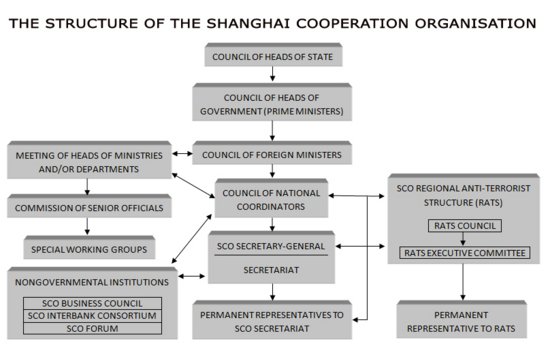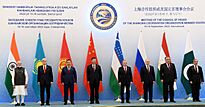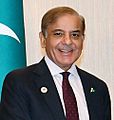Shanghai Cooperation Organisation facts for kids
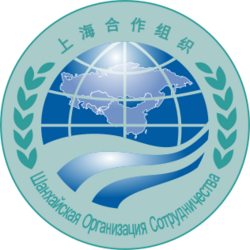 |
|
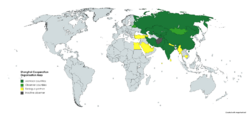
Members Observers Dialogue partners
|
|
| Abbreviation | SCO |
|---|---|
| Predecessor | Shanghai Five |
| Formation | 15 June 2001 |
| Type | Mutual security, political, and economic cooperation |
| Legal status | Regional cooperation forum |
| Headquarters | Beijing, China (Secretariat) Tashkent, Uzbekistan (RATS Executive Committee) |
|
Membership
|
Observers: Dialogue partners: Guest attendees: |
|
Official language
|
|
|
Secretary-General
|
Zhang Ming |
|
Deputy Secretaries-General
|
|
|
RATS
Executive Committee Director |
Ruslan Mirzaev |
The Shanghai Cooperation Organisation (SCO) is a Eurasian political, economic, international security and defence organization established by China and Russia in 2001. It is the world's largest regional organization in terms of geographic scope and population, covering approximately 80% of the area of Eurasia and 40% of the world population. As of 2024, its combined GDP was around 25% of global GDP.
The SCO is the successor to the Shanghai Five, formed in 1996 between the People's Republic of China, Kazakhstan, Kyrgyzstan, Russia, and Tajikistan. In June 2001, the leaders of these nations and Uzbekistan met in Shanghai to announce a new organization with deeper political and economic cooperation. In June 2017, it expanded to eight states, with India and Pakistan. Iran joined the group in July 2023, and Belarus in July 2024. Several countries are engaged as observers or dialogue partners.
The SCO is governed by the Heads of State Council (HSC), its supreme decision-making body, which meets once a year. The organization also contains the so-called Regional Antiterrorist Structure (RATS).
Contents
Origins
The Shanghai Five
The Shanghai Five group was created on 26 April 1996 when the heads of states of China, Kazakhstan, Kyrgyzstan, Russia and Tajikistan signed the Treaty on Deepening Military Trust in Border Regions in Shanghai.
On 24 April 1997 the same countries signed the Treaty on Reduction of Military Forces in Border Regions in a meeting in Moscow, Russia. On 20 May 1997 Russian President Boris Yeltsin and Chinese President Jiang Zemin signed a declaration on a "multipolar world".
Subsequent annual summits of the Shanghai Five group occurred in Almaty, Kazakhstan in 1998, in Bishkek, Kyrgyzstan in 1999, and in Dushanbe, Tajikistan in 2000. At the Dushanbe summit, members agreed to "oppose intervention in other countries' internal affairs on the reason of 'humanitarianism' and 'protecting human rights;' and support the efforts of one another in safeguarding the five countries' national independence, sovereignty, territorial integrity, and social stability." The Shanghai Five structure helped speed up the members' resolution of border disputes, agree on military deployments in border areas, and address security threats.
Developing institutional forms
In 2001, the annual summit returned to Shanghai and the group was institutionalized. The five member nations first admitted Uzbekistan in the Shanghai Five mechanism. On 15 June 2001, all six heads of state signed the Declaration of Shanghai Cooperation Organisation, praising the role played thus far by the Shanghai Five mechanism and aiming to transform it to a higher level of cooperation. From 2001 to 2008, the SCO developed rapidly, establishing a number of permanent bodies and ad hoc initiatives dealing with economic and security matters.
In June 2002, the heads of the SCO member states met in Saint Petersburg, Russia and signed the SCO Charter which expounded on the organisation's purposes, principles, structures and forms of operation. It entered into force on 19 September 2003.
In July 2005, at the summit in Astana, Kazakhstan, with representatives of India, Iran, Mongolia and Pakistan attending an SCO summit for the first time, Nursultan Nazarbayev, the president of the Kazakhstan, greeted the guests in words that had never been used before in any context: "The leaders of the states sitting at this negotiation table are representatives of half of humanity".
By 2007 the SCO had initiated over twenty large-scale projects related to transportation, energy and telecommunications and held regular meetings of security, military, defence, foreign affairs, economic, cultural, banking, and other officials from its member states.
In July 2015, in Ufa, Russia, the SCO decided to admit India and Pakistan as full members. In June 2016 in Tashkent, both signed the memorandum of obligations, thereby starting the process of joining the SCO. In June 2017, at a summit in Kazakhstan, India and Pakistan officially joined SCO as full members.
In 2004 the SCO established relations with the United Nations (where it is an observer in the General Assembly), the Commonwealth of Independent States in 2005, the Association of Southeast Asian Nations (ASEAN) in 2005, the Collective Security Treaty Organization in 2007, the Economic Cooperation Organization in 2007, the United Nations Office on Drugs and Crime in 2011, the Conference on Interaction and Confidence-Building Measures in Asia (CICA) in 2014, and the United Nations Economic and Social Commission for Asia and the Pacific (ESCAP) in 2015. in 2018, SCO Regional Anti-Terrorist Structure (RATS) has established relations with the African Union's African Centre for the Study and Research on Terrorism (ACSRT).
Organisational structure
As of 2020, the Council of Heads of State was the top decision-making body in the SCO, meeting at the annual SCO summits in one of the member states' capital cities. Because of their government structure, the prime ministers of the parliamentary democracies of India and Pakistan attend the SCO Council of Heads of State summits, as their responsibilities are similar to the presidents of other SCO nations.
As of the 4 July 2023 meeting, the Council of Heads of State consists of:
- Xi Jinping (China)
- Narendra Modi (India)
- Mohammad Mokhber (Iran)
- Kassym-Jomart Tokayev (Kazakhstan)
- Sadyr Japarov (Kyrgyzstan)
- Shehbaz Sharif (Pakistan)
- Vladimir Putin (Russia)
- Emomali Rahmon (Tajikistan)
- Shavkat Mirziyoyev (Uzbekistan)
The Council of Heads of Government is the second-highest council in the organisation. This council also holds annual summits, at which time members discuss issues of multilateral cooperation and approves the organisation's budget. As of the 1 November 2022 meeting, Council of Heads of Government consists of:
- Li Qiang (China)
- Narendra Modi (India) (usually sends a deputy, such as EAM Subrahmanyam Jaishankar at the 2021 summit)
- Alihan Smaiylov (Kazakhstan)
- Akylbek Japarov (Kyrgyzstan)
- Shehbaz Sharif (Pakistan) (usually sends a deputy, such as Parliamentary Secretary for Foreign Affairs Andleeb Abbas at the 2020 summit)
- Mikhail Mishustin (Russia)
- Qohir Rasulzoda (Tajikistan)
- Abdulla Aripov (Uzbekistan)
As of 2007, the Council of Foreign Ministers also held regular meetings, where they discussed the current international situation and interaction with other international organisations. As of 2021, the Council of National Coordinators coordinated the multilateral cooperation of member states within the framework of the SCO's charter.
The Secretariat of the SCO, headquartered in Beijing, China, is the primary executive body of the organisation. It serves to implement organisational decisions and decrees, drafts proposed documents (such as declarations and agendas), function as a document depository for the organisation, arranges specific activities within the SCO framework, and promotes and disseminates information about the SCO. The SCO Secretary-General is elected to a three-year term. Zhang Ming of China became the current Secretary-General on 1 January 2022.
The Regional Anti-Terrorist Structure (RATS) Executive Committee, headquartered in Tashkent, Uzbekistan, is a permanent organ of the SCO which serves to promote cooperation of member states against the three evils of terrorism, separatism and extremism. The Director of SCO RATS Executive Committee is elected to a three-year term. Ruslan Mirzaev of Uzbekistan became the current Director on 1 January 2022. Each member state also sends a permanent representative to RATS.
The official languages of the SCO are Chinese and Russian.
Membership
Member states
| Country | Accession started | Member since |
|---|---|---|
| — | 15 June 2001 | |
| 10 June 2015 | 9 June 2017 | |
| 17 September 2021 | 4 July 2023 | |
| 16 September 2022 | 4 July 2024 |
Observer states
| Country | Status granted | |
|---|---|---|
| 2004 | ||
Former observers |
||
| 5 July 2005 | ||
| 7 June 2012 | ||
| 2015 | ||
Dialogue partners
The status of dialogue partner was created in 2008.
| Country | Status approved | Status granted |
|---|---|---|
| 15 or 16 June 2009 | 6 May 2010 | |
| 7 June 2012 | 26 April 2013 | |
| 10 July 2015 | 24 September 2015 | |
| 14 March 2016 | ||
| 22 March 2016 | ||
| 16 April 2016 | ||
| 16 September 2021 | 14 September 2022 | |
| 16 September 2022 | 5 May 2023 | |
| 15 July 2023 | ||
Former dialogue partners |
||
| 15 or 16 June 2009 | 28 April 2010 | |
Guest attendances
Multiple international organisations and one country are guest attendances to SCO summits.
 Association of Southeast Asian Nations
Association of Southeast Asian Nations Commonwealth of Independent States
Commonwealth of Independent States Turkmenistan
Turkmenistan United Nations
United Nations
Future membership possibilities
| Country | Status applied for | Date |
|---|---|---|
| Observer | 2012 | |
| Dialogue partner | 2015 | |
| Dialogue partner | 2016 | |
| Dialogue partner | 2019 | |
| Observer | July 2023 | |
| Dialogue partner | 2024 |
In 2010, the SCO approved a procedure for admitting new members. In 2011, Turkey applied for dialogue partner status, which it obtained in 2013. Turkish Prime Minister Recep Tayyip Erdoğan has stated that he has discussed the possibility of abandoning Turkey's candidacy of accession to the European Union in return for full membership in the Shanghai Cooperation Organisation. This was reinforced again on 21 November 2016, after the European Parliament voted unanimously to suspend accession negotiations with Turkey. Two days later, on 23 November 2016, Turkey was granted the chairmanship of SCO energy club for the 2017 period. That made Turkey the first country to chair a club in the organisation without full membership status. In 2022, 22nd summit of the Shangai Organization on 15 and 16 September in Samarkand. Recep Tayyip Erdogan and his Azerbaijani counterpart, Ilhan Aliev were particularly expected. Asked by media, the Turkish president said that Turkey would seek full SCO membership status.
In 2011, Vietnam expressed interest in obtaining observer status (but has not applied for it).
In 2012, Ukraine expressed interest in obtaining observer status. However, since the deposition of President Viktor Yanukovych, no application has been submitted and there are no current plans to incorporate Ukraine into the organization.
Turkmenistan has previously declared itself a permanently neutral country, which was recognized by a resolution adopted by the United Nations General Assembly, thus precluding its membership in the SCO. Turkmenistan's head of state has been attending SCO summits since 2007 as a guest attendee.
Activities
Cooperation on security
As of 2023, the SCO is primarily centered on security-related concerns, describing the main threats it confronts as being terrorism, separatism and extremism. It has addressed regional weapons trafficking and created terrorist blacklists.
At SCO summit, held in Tashkent, Uzbekistan, on 16–17 June 2004, the Regional Anti-Terrorist Structure (RATS) was established.
In October 2007, the SCO signed an agreement with the Collective Security Treaty Organization (CSTO), in the Tajik capital of Dushanbe, to broaden cooperation on issues such as security and crime.
As of 2010, the organisation was opposing cyberwarfare, saying that the dissemination of information "harmful to the spiritual, moral and cultural spheres of other states" should be considered a "security threat". An accord adopted in 2009 defined "information war", in part, as an effort by a state to undermine another's "political, economic, and social systems". The Diplomat reported in 2017 that SCO has foiled 600 terror plots and extradited 500 terrorists through RATS. The 36th meeting of the Council of the RATS decided to hold a joint anti-terror exercise, Pabbi-Antiterror-2021, in Pakistan in 2021.
Military activities

As of 2009, the organisation's activities expanded to include increased military cooperation, intelligence sharing, and counterterrorism. At the same time, leaders of SCO states repeatedly stated that the SCO was not a military alliance.
As of 2023, the SCO had not provided military support in any actual conflicts. However, as of 2017, military exercises have regularly been conducted among members to promote cooperation and coordination against terrorism and other external threats, and to maintain regional peace and stability. There have been a number of SCO joint military exercises. The first of these was held in 2003, with the first phase taking place in Kazakhstan and the second in China. Since then China and Russia have teamed up for large-scale war games in Peace Mission 2005, Peace Mission 2007 and Peace Mission 2009, under the auspices of the Shanghai Cooperation Organisation. More than 4,000 soldiers participated at the joint military exercises in Peace Mission 2007, which took place in Chelyabinsk, Russia near the Ural Mountains, as was agreed upon in April 2006 at a meeting of SCO Defence Ministers. In 2010, Russian Defence Minister Sergei Ivanov said that the exercises would be transparent and open to media and the public. Following the war games' successful completion, Russian officials began speaking of India joining such exercises in the future and the SCO taking on a military role. Peace Mission 2010, conducted 9–25 September at Kazakhstan's Matybulak training area, saw over 5,000 personnel from China, Russia, Kazakhstan, Kyrgyzstan and Tajikistan conduct joint planning and operational maneuvers.
The SCO has served as a platform for larger military announcements by members. During the 2007 war games in Russia, with leaders of SCO member states in attendance including Chinese President Hu Jintao, Russia's President Vladimir Putin used the occasion to take advantage of a captive audience. Russian strategic bombers, he said, would resume regular long-range patrols for the first time since the Cold War. "Starting today, such tours of duty will be conducted regularly and on the strategic scale", Putin said. "Our pilots have been grounded for too long. They are happy to start a new life".
In June 2014, in the Tajik capital Dushanbe, the idea was brought up to merge the SCO with the Collective Security Treaty Organization. However, as of late 2022, in the wake of Russian invasion of Ukraine in 2022, many SCO and even CSTO members had distanced themselves from military cooperation with Russia.
Economic cooperation
In September 2003, a Framework Agreement to enhance economic cooperation was signed by the SCO member states. At the same meeting the Premier of China, Wen Jiabao, proposed a long-term objective to establish a free trade area in the SCO, while other more immediate measures would be taken to improve the flow of goods in the region. A follow-up plan with 100 specific actions was signed one year later, on 23 September 2004.
In October 2005, during the Moscow Summit of the SCO, the Secretary General of the Organisation said that the SCO would prioritise joint energy projects; including in the oil and gas sector, the exploration of new hydrocarbon reserves, and joint use of water resources. The creation of the SCO Interbank Consortium was also agreed upon in order to fund future joint projects. In February 2006, the first meeting of the SCO Interbank Association was held in Beijing. In November 2006, at The SCO: Results and Perspectives, an international conference held in Almaty, the representative of the Russian Foreign Ministry announced that Russia was developing plans for an SCO "Energy Club". in November 2007, Moscow reiterated the need for this "energy club" at an SCO summit. Other SCO members, however, did not commit themselves to the idea. During the 2008 summit it was stated that "Against the backdrop of a slowdown in the growth of world economy pursuing a responsible currency and financial policy, control over the capital flowing, ensuring food and energy security have been gaining special significance".
At the 2007 SCO summit, Iranian Vice President Parviz Davoodi addressed an initiative that had been garnering greater interest when he said, "The Shanghai Cooperation Organisation is a good venue for designing a new banking system which is independent from international banking systems".
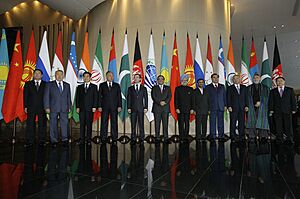
In June 2009, at the Yekaterinburg Summit, China announced plans to provide a US$10 billion loan to other SCO member states to shore up the struggling economies of its members amid the global financial crisis. The summit was held together with the first BRIC summit, and the China–Russia joint statement said that they want a bigger quota in the International Monetary Fund.
In 2014, the Eurasian Economic Union was founded in which Russia, Kazakhstan and Kyrgyzstan are members.
During the 2019 Bishkek summit, Pakistani Prime Minister Imran Khan suggested taking steps to trade in local currencies instead of U.S. dollars and setting up financial institutions including an SCO bank.
In June 2022, Iran's Deputy Foreign Minister for Economic Diplomacy Mehdi Safari suggested creating a single SCO currency to facilitate trade and financial transactions among SCO members.
During 19–22 October 2022, Iran hosted SCOCOEX, an international conference and exhibition on economic cooperation opportunities available to the SCO member states and partners.
As part of the SCO's economic agenda, it has established a relatively successful student exchange program called the SCO University.
Cultural cooperation
Culture ministers of the SCO met for the first time in Beijing on 12 April 2002, signing a joint statement for continued cooperation. The third meeting of the Culture Ministers took place in Tashkent, Uzbekistan, on 27–28 April 2006.
An SCO Arts Festival and Exhibition was held for the first time during the Astana Summit in 2005. Kazakhstan suggested an SCO folk dance festival to take place in 2008, in Astana.
SCO+
The SCO+ forum format was initiated by the United Russia party in October 2020. This format includes inter-party interaction not only of the countries of the Shanghai Cooperation Organization (members, observers, candidates) but also of the CIS and BRICS countries.
It was first used during the SCO+ international inter-party forum "Economy for People" on 22–23 October 2020. The forum was attended by speakers from 25 countries, including the chairman of the United Russia party, Dmitry Medvedev, ministers of the SCO countries, Serbian President Aleksandar Vučić, and ambassadors and diplomats of the CIS and BRICS countries. Russian President Vladimir Putin sent greetings to the forum participants.
Summits
According to the Charter of the SCO, summits of the Council of Heads of State shall be held annually at alternating venues. The locations of these summits follow the alphabetical order of the member state's name in Russian. The charter also dictates that the Council of Heads of Government (that is, the Prime Ministers) shall meet annually in a place decided upon by the council members. The Council of Foreign Ministers is supposed to hold a summit one month before the annual summit of Heads of State. Extraordinary meetings of the Council of Foreign Ministers can be called by any two member states.
List of summits
| Date | Country | Location |
|---|---|---|
| 14–15 June 2001 | Shanghai | |
| 7 June 2002 | Saint Petersburg | |
| 29 May 2003 | Moscow | |
| 17 June 2004 | Tashkent | |
| 5 July 2005 | Astana | |
| 15 June 2006 | Shanghai | |
| 16 August 2007 | Bishkek | |
| 28 August 2008 | Dushanbe | |
| 15–16 June 2009 | Yekaterinburg | |
| 10–11 June 2010 | Tashkent | |
| 14–15 June 2011 | Astana | |
| 6–7 June 2012 | Beijing | |
| 13 September 2013 | Bishkek | |
| 11–12 September 2014 | Dushanbe | |
| 9–10 July 2015 | Ufa | |
| 23–24 June 2016 | Tashkent | |
| 8–9 June 2017 | Astana | |
| 9–10 June 2018 | Qingdao | |
| 14–15 June 2019 | Bishkek | |
| 10 November 2020 | videoconference | |
| 16–17 September 2021 | Dushanbe | |
| 15–16 September 2022 | Samarkand | |
| 4 July 2023 | videoconference | |
| 3–4 July 2024 | Astana | |
| 2025 | TBA |
| Date | Country | Location |
|---|---|---|
| 14 September 2001 | Almaty | |
| — | — | — |
| 23 September 2003 | Beijing | |
| 23 September 2004 | Bishkek | |
| 26 October 2005 | Moscow | |
| 15 September 2006 | Dushanbe | |
| 2 November 2007 | Tashkent | |
| 30 October 2008 | Astana | |
| 14 October 2009 | Beijing | |
| 25 November 2010 | Dushanbe | |
| 7 November 2011 | Saint Petersburg | |
| 5 December 2012 | Bishkek | |
| 29 November 2013 | Tashkent | |
| 14–15 December 2014 | Astana | |
| 14–15 December 2015 | Zhengzhou | |
| 2–3 November 2016 | Bishkek | |
| 30 November 2017 | Sochi | |
| 11–12 October 2018 | Dushanbe | |
| 1–2 November 2019 | Tashkent | |
| 30 November 2020 | videoconference | |
| 25 November 2021 | videoconference | |
| 1 November 2022 | videoconference | |
| 26 Oсtober 2023 | Bishkek | |
| 15-16 October 2024 | Islamabad |
Gallery of leaders of member states
See also
 In Spanish: Organización de Cooperación de Shanghái para niños
In Spanish: Organización de Cooperación de Shanghái para niños
- Asia Cooperation Dialogue
- Asia–Europe Meeting
- Association of Southeast Asian Nations
- Belt and Road Initiative
- Bay of Bengal Initiative for Multi-Sectoral Technical and Economic Cooperation
- BRICS
- China–Russia relations
- Collective Security Treaty Organization
- Conference on Interaction and Confidence-Building Measures in Asia
- Continental union
- Eurasian Economic Union
- Eurasianism
- South Asian Association for Regional Cooperation


